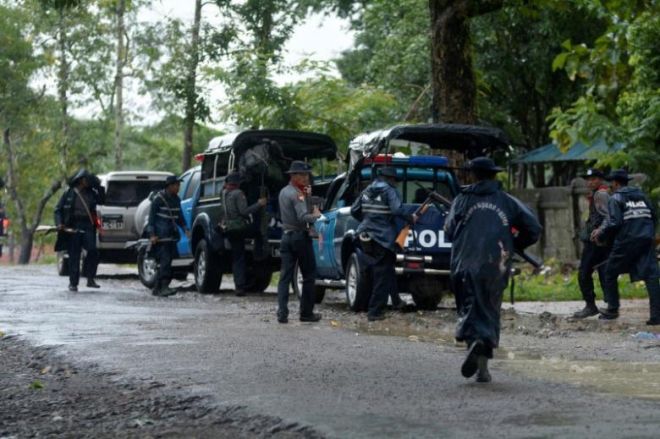Rohingya Crisis: ‘Latest Violence Marks Predictable Escalation in Burma/Myanmar’s Genocidal Process’
ASIA--PACIFIC, 17 Oct 2016
Jacob J – International Business Times

Police forces prepare to patrol in Maungdaw township at Rakhine state, northeast Myanmar, October 12, 2016.
Reuters
15 Oct 2016 – Reports of the latest attacks against Rohingya Muslims in Myanmar may signal a new phase in the “genocidal situation”, researchers at London’s Queen Mary University have said.
Credible reports are emerging of extra-judicial killings, arbitrary arrests, and raids on Rohingya homes by Myanmar security forces, researchers at the college’s International State Crime Initiative (ISCI) said.
They said verifiable information on the “intense persecution” of Rohingyas was difficult to obtain due to the notorious isolation and militarisation of Northern Rakhine State.
More than 20 people have died in clashes in Myanmar’s restive Rakhine state, which is home to the Rohingya Muslims, reports said earlier this week.
Northern Rakhine state is “in effect an information black hole, and in situations where allegations of human rights violations are difficult or impossible to independently verify – because of state restrictive practices – the onus must be on the state to investigate or disprove those allegations”, Penny Green, Professor of Law at Queen Mary University of London and Director of ISCI, said.
“We sounded the alarm in 2015 that what we saw amounted to the early stages of a genocidal process,” Green said.
“Local sources now report a ramped up security and military presence, additional restrictions on freedom of movement, and a further limiting of access to food and healthcare. We are concerned that these latest developments may represent a new chapter in the persecution of the Rohingya, and a potentially more deadly phase of genocide. The fact that it’s practically impossible to verify or confirm any of these reports underlines the intensity of Rakhine state’s isolation from international view.”
Illegal Immigrants from Bangladesh
Myanmar’s Rohingya crisis has remained unsolved for decades despite international rights agencies raising voice against their suppression in a land where they have lived for generations.
The Buddhist nationalists in Myanamr call Rohingya illegal immigrants from Bangladesh while rights organisations call them one of the world’s most persecuted peoples. The 1.1 million stateless Rohingya people in Myanmar say they belong there as their predecessors have lived in the country for generations. Thousands of Rohingya people live in refugee camps, in deplorable conditions.
Myanmar government consistently denies international journalists and human rights organisations access to Northern Rakhine, ISCI said.
Green added that the merging evidence of indiscriminate violence by security forces mark a “disturbing yet entirely predictable escalation in the genocidal process”.
DISCLAIMER: The statements, views and opinions expressed in pieces republished here are solely those of the authors and do not necessarily represent those of TMS. In accordance with title 17 U.S.C. section 107, this material is distributed without profit to those who have expressed a prior interest in receiving the included information for research and educational purposes. TMS has no affiliation whatsoever with the originator of this article nor is TMS endorsed or sponsored by the originator. “GO TO ORIGINAL” links are provided as a convenience to our readers and allow for verification of authenticity. However, as originating pages are often updated by their originating host sites, the versions posted may not match the versions our readers view when clicking the “GO TO ORIGINAL” links. This site contains copyrighted material the use of which has not always been specifically authorized by the copyright owner. We are making such material available in our efforts to advance understanding of environmental, political, human rights, economic, democracy, scientific, and social justice issues, etc. We believe this constitutes a ‘fair use’ of any such copyrighted material as provided for in section 107 of the US Copyright Law. In accordance with Title 17 U.S.C. Section 107, the material on this site is distributed without profit to those who have expressed a prior interest in receiving the included information for research and educational purposes. For more information go to: http://www.law.cornell.edu/uscode/17/107.shtml. If you wish to use copyrighted material from this site for purposes of your own that go beyond ‘fair use’, you must obtain permission from the copyright owner.